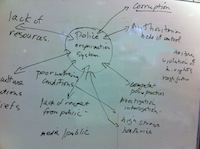What Makes a Prevention Strategy Effective?

The literature evaluating interventions across a broad range of thematic areas indicates that to be effective, research strategies must be based on methodologically sound and empirically grounded research at their intervention site, they must be designed for the specific context, attending to social and cultural factors, and they must be based on a ‘theory of change’.
With these principles in mind, we developed a research methodology that combined empirical site-specific research and theoretical or conceptual research interrogating the general factors that underpin systematic and institutional violence.
In developing our methodology and research process, we put together a team comprising country-based researchers in Nepal and Sri Lanka with expertise and intense familiarity with the local context and international disciplinary experts whose work provided a broader comparative analysis. We involved the whole team in the research planning, recognising that with their diverse disciplinary and cultural perspectives, each would bring valuable insights to the process of working out how best to develop a sound and robust understanding of the root causes of torture.
This collaborative process of research design also allowed us to develop common languages across disciplines and to plan our research so that the different perspectives brought to bear from the different parts of the research project would speak with each other.
